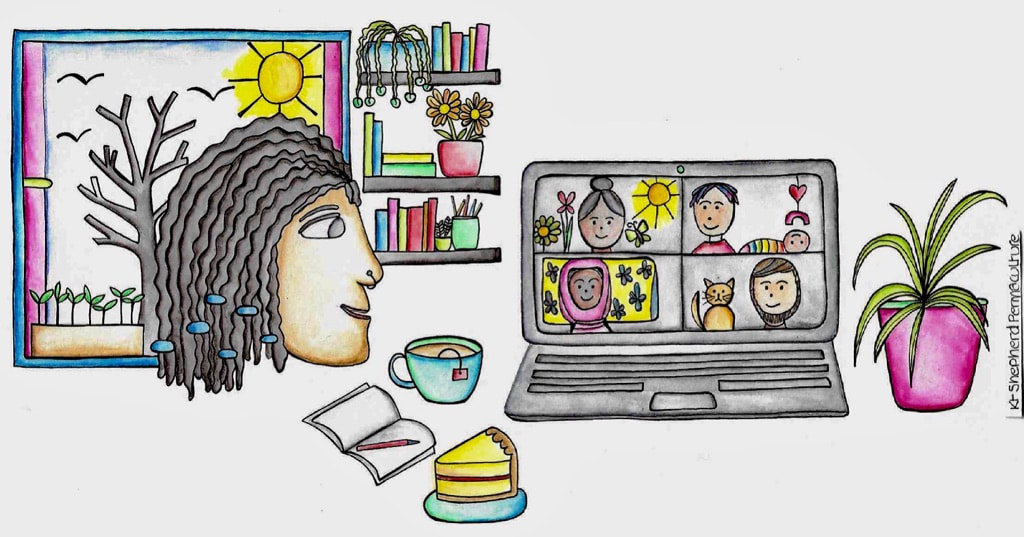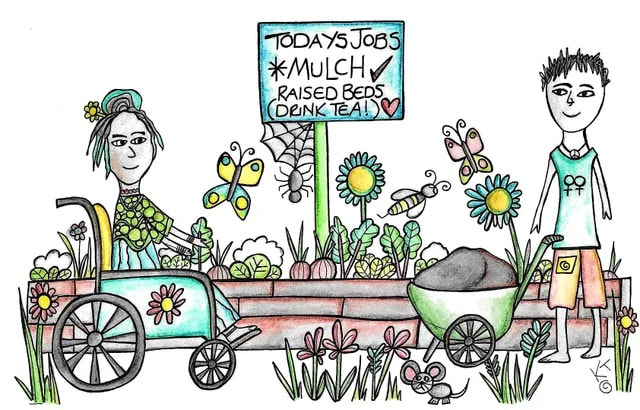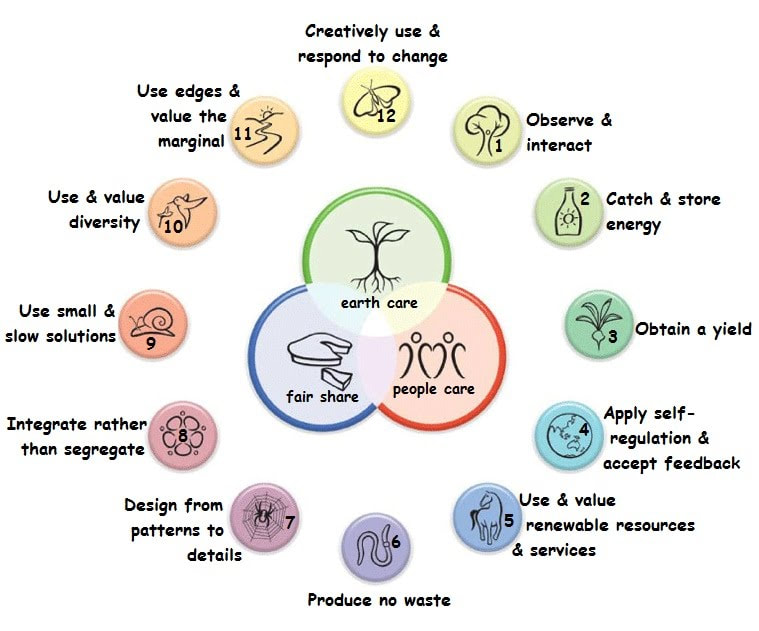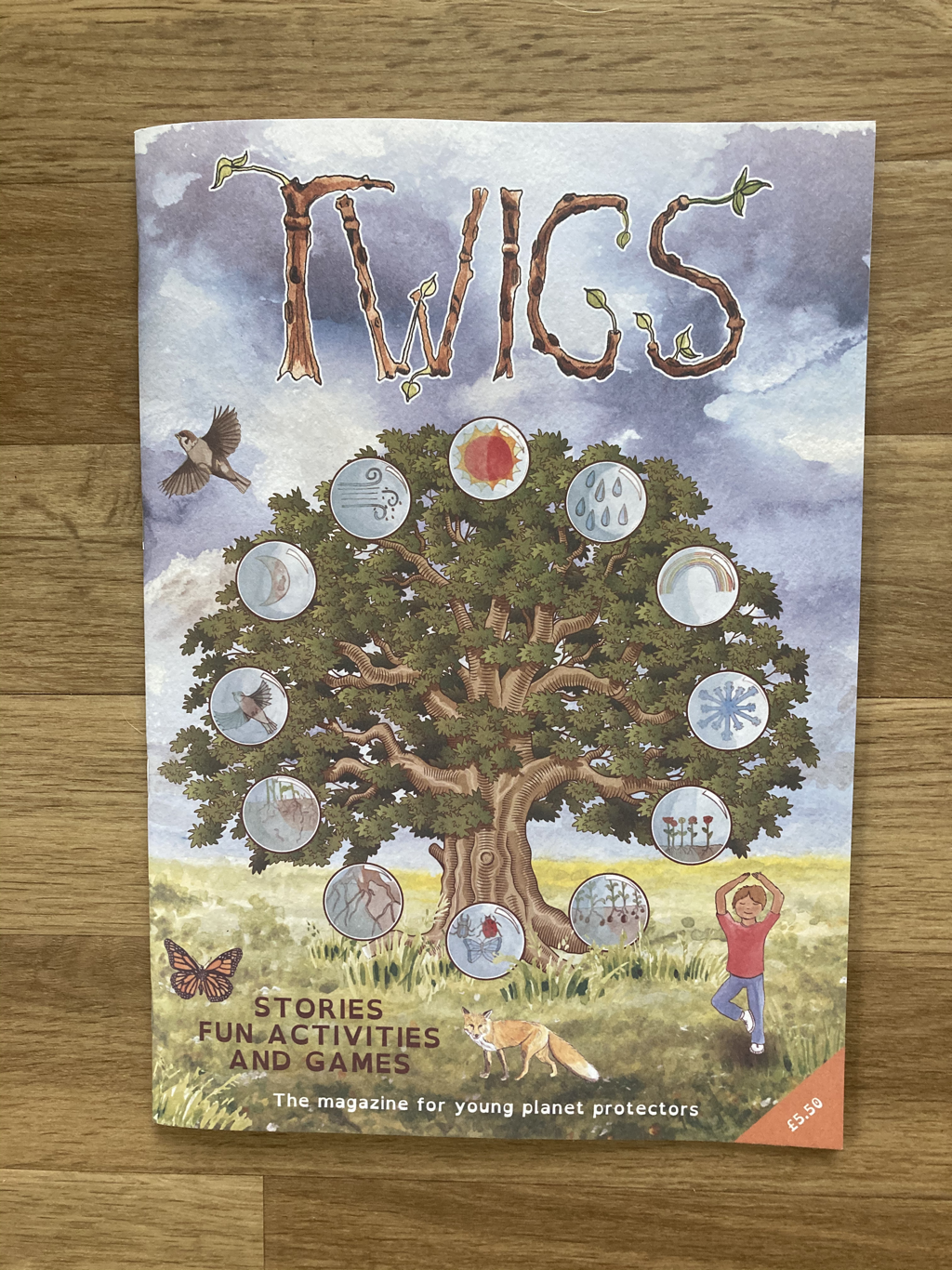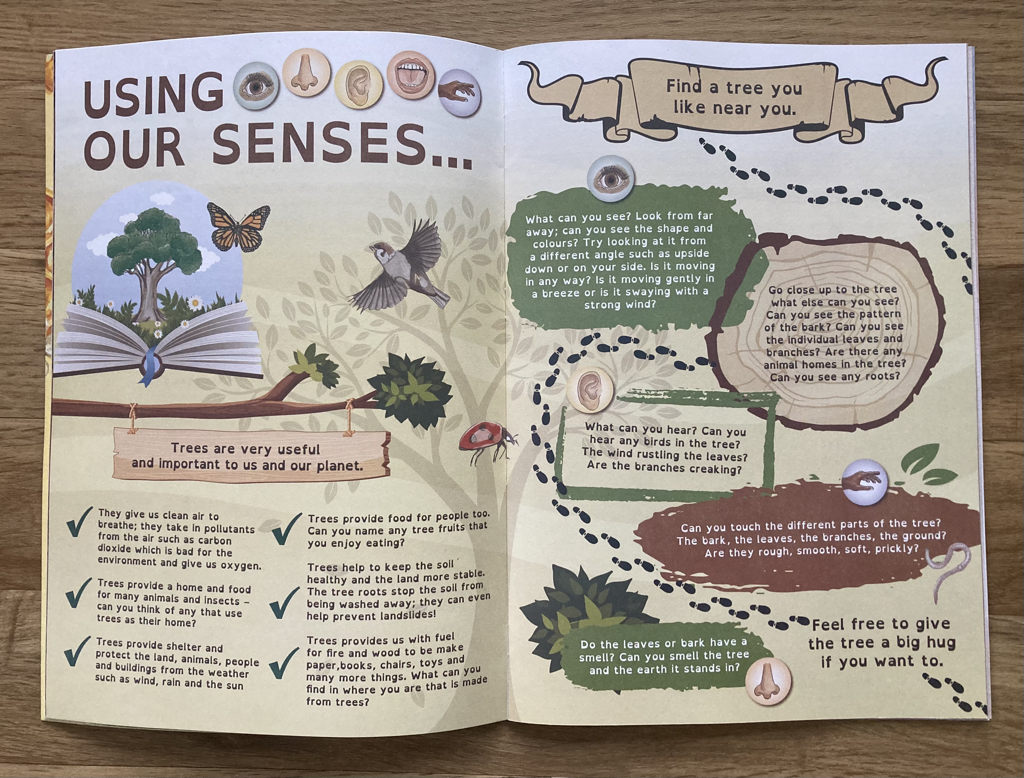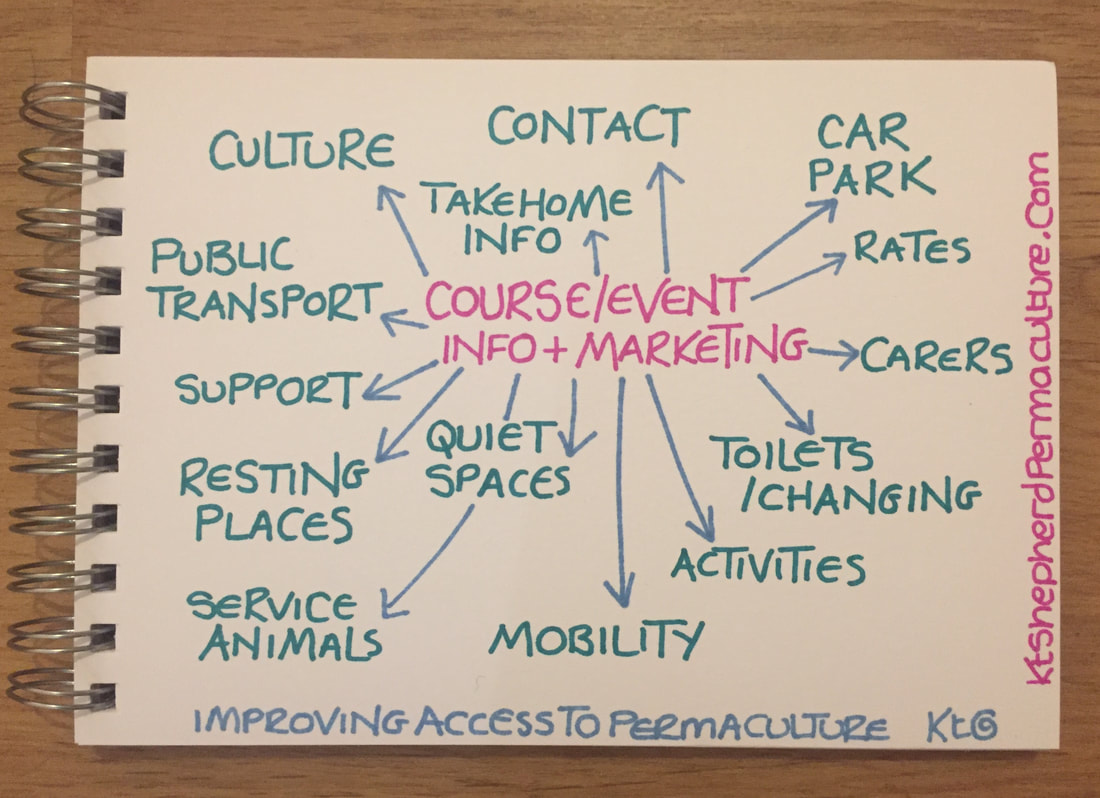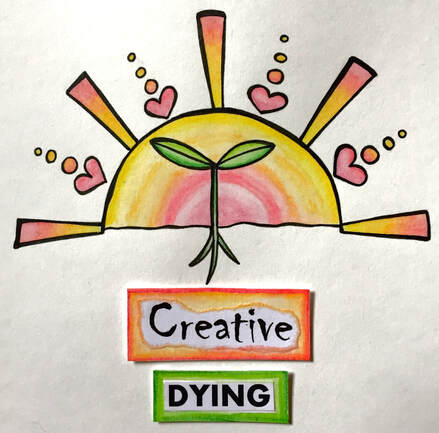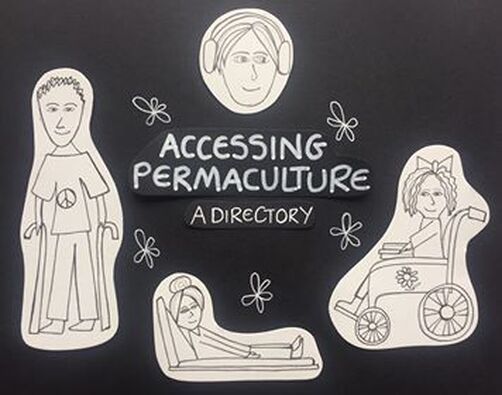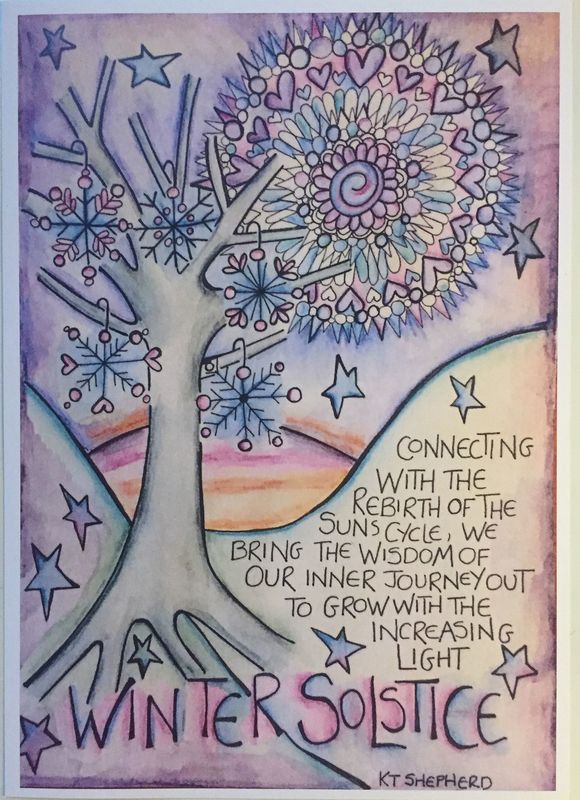|
An online discussion through Zoom, then the creation of a zine. A project by Kt Shepherd & Kate Dickinson. This is timed to connect with the Edges of both the Festival Of Permaculture and My Green Community events from the Permaculture Association in September 2022 Take part in a permaculture project documenting and sharing about how permaculture principles can enable people affected by disability and/or chronic illness/long term health issues (CI/LTHI), to thrive. This project is aimed at both people living with disabilities and/or CI/LTHI and/or people supporting others living with disabilities and/or CI/LTHI We will be hosting 2 x 1 hour Zoom sessions over the weekend of 17/18th September. The Saturday 17th September session is at 10-11am The Sunday 18th September session is at 3-4pm Both sessions are at BST (British Summer Time) timings You are welcome to attend either or both sessions We are inviting participants to share experiences they have had or ideas about, using the Holmgren Permaculture Principles in managing their disabilities and/or CI/LTHI and/or supporting someone else with disabilities and/or CI/LTHI This link features more information about each of the 12 principles Permacultureprinciples.com Ways of sharing these experiences and ideas with others in the session might include - Talking Sharing an image (photo, doodle, illustration, mind map) Written/typed so that Kate or Kt can share on your behalf Participants will also be encouraged to discuss these experiences and ideas in the sessions. There is no pressure to either share or discuss in the sessions. People who want to attend the sessions and just listen in are very welcomed The Zoom sessions will be recorded and then the content shared about experiences and ideas will be collated and used to create a zine which will be available to others as a resource. The zine will be available in both electronic and paper versions. The zine content can be anonymous or participants can be named and attributed to their experiences and ideas - either preference is great. In the week after the Zoom sessions you will be asked to complete a short evaluation tool so that we can learn from the experiences of participants and plan future events accordingly. We will be sharing information about this project on social media, on Kt’s blog and via the Permaculture Association’s website events notice board Please email Kt if you would like to take part in this project - remember it’s totally fine and very welcomed to just listen in to the ideas sharing and discussion. Also, feel free to email me with any questions you may have. [email protected]
2 Comments
It’s been such a pleasure to help behind the scenes with the creation of Twigs “the magazine for young planet protectors” by Twigs’ creator, my lovely talented friend Clare Carney . The first edition is now available to buy via the Twigs Website where you can also find out how permaculture ethics and principles have been used in the design of this beautiful project. “Twigs is aimed at children aged 4 years and upwards and will help children and families connect with nature, and through compassion and love, help them create a sustainable and positive future.” Twigs includes -
Some guidelines for Permaculture event information and marketing, for improving access to Permaculture for people with chronic illness and/or disability, and people who are neurodivergent.
This post is also available as a PDF here Earlier this year I published an article on my blog - Accessing Permaculture for people with chronic illness and/or disability - positives, challenges and suggestions for a more inclusive permaculture. In this short post I share some suggestions, from the linked post, of information to include in general Permaculture Course and Event descriptions and marketing. This in turn will then help more people with chronic illness and/or disability and neurodivergent people to access and then utilise Permaculture Design This list isn’t meant to be prescriptive and it isn’t exhaustive. It’s been compiled from the stories, voices and ideas of people who responded to my request for information, for my initial article linked above.
Please feel free to use this information in your own work or to contact me with any feedback, ideas or questions. For discussion about some of the issues identified, join the Permaculture, Chronic Illness, Neurodiversity and Disability Facebook Group Using Permaculture to improve how we die I am a palliative care nurse and permaculture educator with a spiritual self which is deeply rooted in Earth-based seasons and patterns. Issues relating to death and dying are intrinsic to most aspects of my life. Several years ago, I started exploring how permaculture can improve how we die in the UK and in many parts of the world. Central to this was the fact that “Dying with dignity” appears in Holmgren’s Permaculture Flower, and generated many interesting discussions in my peer groups within the permaculture community. This eventually resulted in the launch of my permaculture project: Creative Dying, a free online resource.
Death and Dying in the UK In the UK and in many other parts of the world. Death and dying is still a very difficult, taboo topic, cloaked in the fear and unknown. The way in which many of us die at present in the UK is at odds with permaculture principles and ethics. People do not often get the death they would like, many needlessly dying in hospital experiencing unnecessary and distressing procedures, tests and treatment, away from their home, with resulting feelings of confusion and lack of control. Inequalities around whether a person is enabled to make decisions about what they would want for their end of life and care after death are huge – age, disease type, social class, sexuality, race, mental health, with very real consequences about whether someone then has a ‘good death.’ In my experience, fear, distress and lack of control about how we die can often mean life time effects on emotional and physical health to those left behind, due to complex bereavement. The environmental impacts of how we die are also very significant. – from the resources needed for end of life care in hospital, to the damaging actions of many aspects of the funeral/after death industry, - embalming, cremation, coffin materials - and financial affordability (the average cost of a funeral in the UK in 2018 was £3500 for a cremation, and nearly £4300 for a burial ) My experience in the permaculture community is that even within groups of people who are very knowledgeable, empowered and solutions focused about other aspects of their lives are reluctant to talk about how their end of life might be. So, what can permaculture offer as a way solutions focused way forward? Before We Die People who talk about and plan for their death, tend to have a much better experience of death, and those around them : - family, friends and community - then go on to have a more open and positive attitude towards death, loss and supporting others as they approach death. Planning for what we want to happen as we die and after our death is much easier to do when we are well, than waiting until we are unwell and perhaps too poorly to make decisions. There is a much greater chance that End of Life wants and wishes will happen if we have a plan, and others close to us, are aware of those plans. Ways to start talking about death and dying, and making plans include:-
As We Die If we had some control (most people, with the right support, do), what would we want our death to look like? Where would we want to be (if possible?) Who would we want to be there? What support would we need and want? One exciting and rapidly growing role is that of a Death Doula – non-medical people who are trained to be alongside terminally ill people and support those close to them, at the end of their life. There are several places in the UK where Death Doula training is available now and the numbers of people working in this sphere is spreading steadily. Obviously we cannot all predict how we die and for some we might not be able to achieve the ideal death we hoped for ourselves. It can be useful to have a ‘plan B’. For example, if you were to die in hospital, who would you want to be there? What kind of medical/nursing intervention would you want? What possessions, music, art would you want to surround you from home? After We Die What do we want to happen to our bodies after we die? How do we want our life to be remembered and celebrated? With our present systems of after death care in the UK, many people can feel frustrated, and let down, with their experience of grief deepened, as after death care activities carried out by health care professionals and then practitioners in the funeral industry can feel impersonal and profoundly disconnected from the identity of the person who has died. In addition, the financial cost of much of this is beyond the reach of an ever increasing number of people. There is no legal obligation to use a funeral director for after death care in the UK – though if you choose to do so, there are some wonderful Funeral Director and celebrant businesses who can ensure the whole process is as in keeping with the life of the person who has died as possible. In addition wherever we die, we can choose to have friends and families take care of us (wash, change clothing . Making this request known to health care staff involved can mean this is more likely to happen In the UK one of the most Earth regenerating ways to care for the body of someone who has died, is burial, where the body is wrapped/contained in a locally sources biodegradable material, in a geographical location where other life can benefit from the nutrients released by our decomposing corpse. (I’m currently knitting a cover from UK grown wool – which will be used a blanket, for hopefully many years, then my plan is my body will be wrapped in it before I am buried as close as possible to the place where I spend my final weeks of life.) Organised Woodland Burial sites are the most obvious choice of location., but there are other perfectly legal options. Globally there are some great projects emerging looking at ways of increasing Earth Care with relation to what happens to our bodies after we die. These include:- Recompose - transforms bodies into soil so that we can grow new life after we die. The Living Urn – growing trees from human ash Ecoffins - environmentally friendly coffins and caskets Conclusions Permaculture design offers us many answers to how we can improve an experience we all face, and which connects every living being and system on our beautiful planet. Opening up conversations, exploring fears, empowering ourselves with knowledge and support and then making documented plans are all very real ways of ensuring we work towards Earth Care, People Care and Fair Shares as we die. Resources In this article I have provided an overview about how permaculture design can help with way we die, which will hopefully engage a much bigger conversation. The following resources can help you to explore this topic further. As part of Creative Dying, my own project exploring how permaculture can improve how we die, I have a regularly updated page sharing many online, in real life and print resources. Go to Creative Dying for lots more information and ideas about using permaculture to improve how we die. Other (UK focused) favourite key online resources of mine are Natural Death Society Dying Matters Power of Attorney Compassionate Communities Soul Midwives For those people who use social media as a way of connecting and learning new knowledge, there is a wonderful diverse community of people globally working word to raise the profile of improving attitude and experience of death, dying and bereavement. The hashtag often used to link this work is #deathpositive. Finally – I would like to acknowledge the potential for triggering difficult feelings relating to loss and bereavement that people may experience through reading this article. These reactions are totally understandable and healthy. Many of us have experienced events where grief has been ongoing and complex. If this has happened for you then giving yourself to engage in activities which for you can provide the support you need is very much ok. If you find that you are needing something more than your usual emotional support tools then I can recommend the following links as first steps What’s Your Grief Cruse Bereavement Care An earlier version of this article "The Art of Dying Creatively" was also published in Permaculture Magazine (Autumn No 93) I'm starting to put together a directory of permaculture projects in the UK, (demonstration sites, courses, events, other permaculture services), where issues of access for people with chronic illnesses, disabilities and/or neurodiversity, are included as part of the project design.
Does your permaculture demonstration site , course, event or other permaculture service, actively encourage the participation and connection of people with chronic illness, disabilities and/or neurodiversity? If so and you would like to feature in this developing online resource, please email me [email protected] and I will send you a short questionnaire to complete. For more information about accessing permaculture for people with chronic illness and disabilities click here For a list of top tips about how to improve access to permaculture for people with chronic illness and disabilities click here To connect with discussions about these topics and more, feel free to join the Facebook Group Permaculture, Chronic Illness, Neurodiversity and Disability Top tips for permaculture events/courses facilitators and permaculture demonstration sites 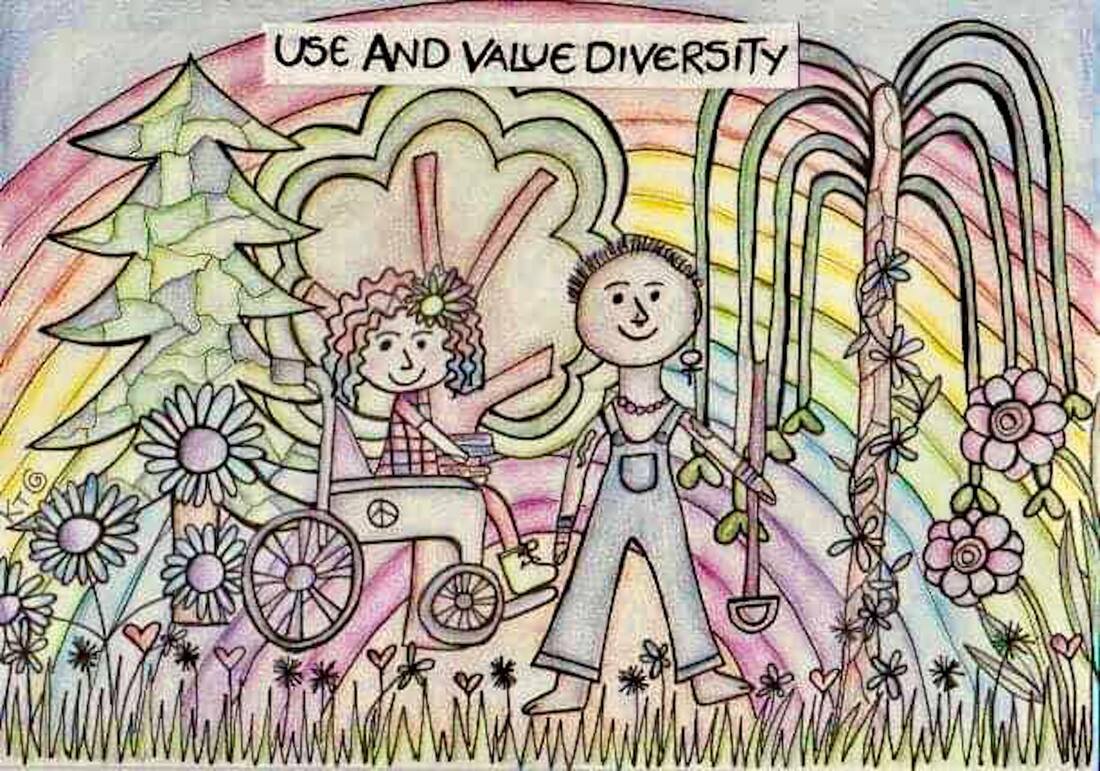 Kt Shepherd Illustrations Kt Shepherd Illustrations In February of this year I published an article on my blog - Accessing Permaculture for people with chronic illness and/or disability - positives, challenges and suggestions for a more inclusive permaculture. In this post I share the "top tips" for permaculture events/courses facilitators and permaculture demonstration sites, arising from the article. (These top tips are also available as a PDF here)
My Winter Solstice Doodle Prints , are available to buy now, with 100% of the profit going to support Manorlands Hospice, in Oxenhope, West Yorkshire. (England).You can find out about the amazing services Manorlands provides via the link tagged in this post . Its an organisation very close to my heart, as I've nursed in various roles at Manorlands over the last 15 years, and it's been a wonderful place to work. The Winter Solstice Doodles are A4 in size on recycled card and Footprint Workers Co operative in Leeds have done a fab job in transforming my creativity into beautiful prints. They've been a great organisation to work with and I can very much recommend them.
PRICES Prints are £12.50 each which includes £2.50 for printing, packaging and postage in the UK, and £10 donated directly to Manorlands. If you are on a low income, prints are available at a reduced price of £7.50 which includes £2.50 for printing, packaging and postage in the UK, and £5 donated directly to Manorlands. If you would like a print, but are unable to afford the reduced price, or you would like to buy several prints, then please contact me and we can chat about this. Payment is via PayPal. Please send me a direct message on Facebook or Instagram or via email, with your order, including a postal address, and I will let you know PayPal details. |
Welcome to my blog. Here I aim to share everyday examples of how permaculture can provide healing and regeneration for ourselves, our communities and our planet.
Search My BlogSign up for my monthly newsletter, Full Moon Flourish. Here I will be sharing updates about my creative permaculture projects, plus links to inspiring work from other women in permaculture.
Archives
May 2024
Categories
All
|
